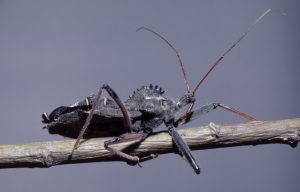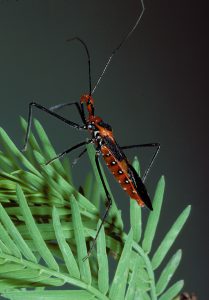
Wheel bugs have large beaks and a distinctive semicircular crest on their backs resembling a cogwheel. Photo by Gerald J. Lenhard, Louisiana State University, Bugwood.org.
As a gardener, the summer is the season you might feel it takes knightly status to grow fruits and vegetables. You put on your metaphorical armor, hold up your shield, and draw your sword to battle the stink bugs, squash vine borers, armyworms, green peach aphids, and more.
In these instances, it may feel like nothing in nature is on your side. But alas, there are a few insects out there that carry their own defenses. One of them is the ferocious assassin bug. These insects are predacious, loaded with powerful curved beaks called proboscises that pierce their unsuspecting prey. Once pierced, the assassin bug injects a toxin that liquefies the muscles and tissues of the prey. It then sucks out the liquefied tissue, killing its host.

Although milkweed assassin bugs vary in appearance worldwide, those found in the United States are distinctly orange and black. Photo by Gerald J. Lenhard, Louisiana State University, Bugwood.org.
Assassin bugs feed on a wide range of insects, including many types of caterpillars, stinkbugs, aphids, flies, beetles, and even mosquitoes.
While assassin bugs are our garden allies, be mindful, as their injection does pack quite the punch! Fortunately, although a “bite” from an assassin bug is painful, they do not generally require medical attention. But do seek medical attention if it causes any type of allergic reaction such as swelling, itching, hives, or difficulty breathing.
There are nearly 3,000 known assassin bug species, including many in Florida. Common species you may come across in your Florida garden are the wheel bug (Arilus cristatus) and the milkweed assassin bug (Zelus longipes). Give them their space but know that they are on your side.
Learn more about wheel bugs and milkweed assassin bugs at the UF/IFAS Featured Creatures website:
- The wheel bug: http://entnemdept.ufl.edu/creatures/trees/wheel_bug.htm
- The milkweed assassin: http://entnemdept.ufl.edu/creatures/beneficial/bugs/zelus_longipes.htm
- Dung Beetles of the Florida Panhandle - June 26, 2025
- Summer Veggies That Can Take The Heat - May 15, 2025
- Stopping Tomato Blossom-End Rot Before It Starts - April 3, 2025
